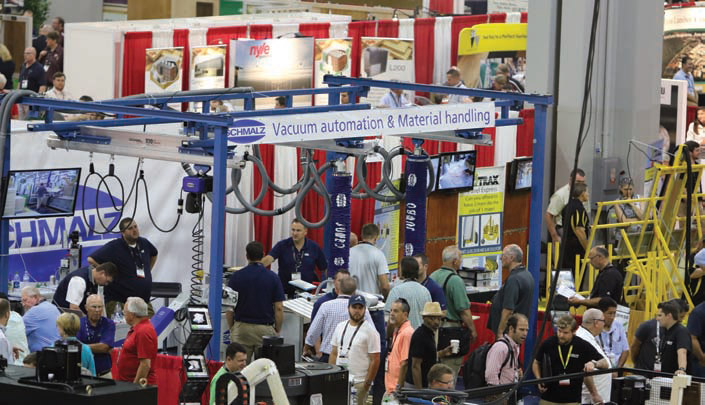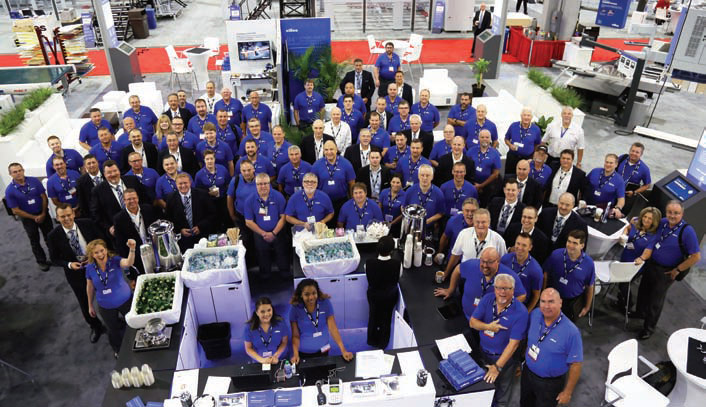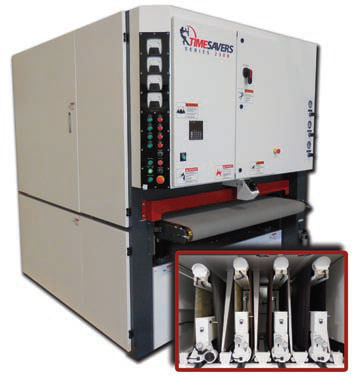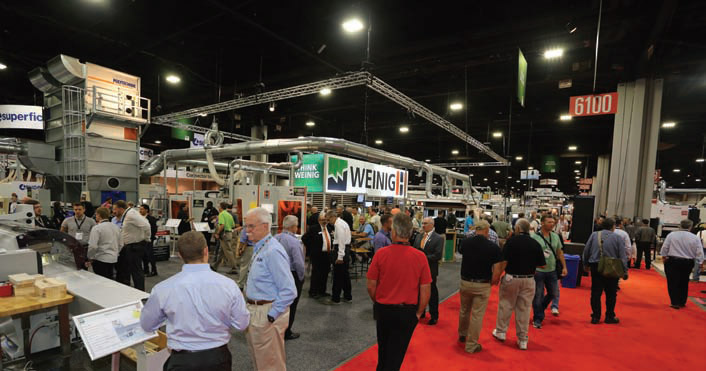IWF Report, Atlanta 2016
26 October 2016North American business is booming. The 2016 International Woodworking Fair (IWF) in Atlanta, Georgia, is the major show for panel manufacturers and this year was a roaring success. Julian Champkin was there and teases out common themes.
In recent years the biennial International Woodworking Fair in Atlanta had shrunk from its pre-2008 heyday. But as Dylan might have put it, the times they are a-changin’. Atlanta is surging back with a vengeance.
The 2014 show was bigger than 2012; the 2016 show, held from August 24-27, was bigger again. Two large halls were packed solid with stands. Exhibitors came from as far away as Turkey and China – 90 countries in all were represented. More encouraging still, all exhibitors were reporting great business. "We opened at 8.30 am. It seemed that by 8.31 we were full of customers," said one. The fair attracted 16,000 visitors, up from 14,400 in 2014. "We saw double digit growth, in attendance, exhibit space, and number of exhibitors’ said IWF chairman Tom Unsrud. Two themes were commonly, almost universally, reported by exhibitors.
One was the need to supply customisation; the customer is king now, and demands his own product, tailored to his own specific needs. Hence manufacturers need flexibility: to be able to cope with short runs of products with differing specifications; and with rapid change-over times between them. The second theme was automation, which can, among other things, supply exactly that.
Also universal was satisfaction with the state of the market. Demand is more than healthy – so much so that backlogs until February 2017 in filling orders were not uncommon. There were customers at the show "with serious money, seriously willing to invest," said Jordi Reichert, head of press sales at Hymmen – and he was far from alone in that finding. The 2008 crash is becoming an ever-more-distant memory: now customers are ordering again – and in volume. Orders for replacement of old machinery showed optimism in the revived housebuilding and re-modelling markets; orders for new equipment for expansion were similarly buoyant.
Robert Perralt of Pallmann said that he had received enquiries at the show for two complete new lines: for particleboard in South America and for MDF in Pakistan. "If those pan out it will be fantastic". For him, as for many others, Atlanta was proving a highly successful show.
Process technology provider Bürkle was there, unveiling its ‘new at Atlanta’ UV drying equipment for surface coatings.The system uses LED lights in place of the traditional mercury vapour lamps – resulting, says Bürkle’s Mark Joel, in less heat and less waste – another common theme for the fair. As important as savings in energy are savings in time: "This gives instant curing as it comes off the machine". Bürkle was also showing its lamination line. "High gloss is a big trend now," said Mark Joel – a trend also reported by many other exhibitors.
Abrasive machine specialists Timesavers was showing its big sanders, in particular the new four-belt upgrading of the three-belt machines that were first introduced 15 years ago. "The constant demand from customers is for finer finishing," said sales manager Dewayne Kangas, echoing again the smoother and glossier trends in panel surfacing. The fourbelt version gives, as well as finer finishes, faster feed rates, and, says Dewayne, at an inexpensive price tag. "We are competing in the middle market. The US market is phenomenal just now. Business is booming and we cannot build the machines fast enough." "Best show since ‘92," said Scott Hunter of sanding belt makers SIA. "The decision-makers are coming by – they used to just send their staff. The market is trending upwards.
The wide belt manufacturers are very busy and that is good for us because we put belts on their machines."
Grecon felt similarly. "We have 25% more people visiting our stand than two years ago. It’s been hard to find a hotel room. This is a really good platform for us to present our new products," said their sales manager, Alexander Reed.
GreCon had three new launches at the show: a laser thickness gauge in carbon fibre housing for temperature stability and accuracy; a raw density profiler; and a scalping roller for enhanced homogeneity in boards. All three feed back data constantly to a central control point. All three are part of the big-data revolution in qualityand efficiency-control that is the basis of Industry 4 and that was yet another common theme of IWF Atlanta.
GreCon, as are several other wood based machinery companies, is diversifying outside the wood panel industry, into such things as rock wool and insulation. This may not be a bad thing for the wood based panel industry.
"It benefits our wood side," said Alexander. "We can feed experiences we learn outside back to the wood based industries. Safety standards, data handling, automation – are they being handled in the wood industries in the same way, as efficiently, or less or more efficiently, as in areas outside that sometimes-too-closed circle?" Automation is again key here: "We see one person, in one location, controlling remotely the rest of the production system. So our own monitoring systems must not depend on someone being stationed at every vulnerable spot. They must supply data for later analysis. With everything monitored, the weak spots can be found and managers can compare performances between machines."
On that same theme machinery supplier Stiles, a large exhibitor, was giving wellattended presentations on how intelligent software is transforming panel manufacture into a seamless whole, from stock control to final delivery. More of this, we hope, in our next issue.
With rising gas prices, cost and energy efficiency are becoming issues as never before. "Two years ago if I offered a more energy-saving machine, few were interested; now, everyone is" said Jordi Reichart, head of sales at Hymmen. That company, after some difficult years, is coming back to the market with a new product range. In place of short-cycle presses are multi-opening presses, industrial digital printing lines, and continuous double-belt presses. Market leaders in laminating lines, they are concentrating on their market strengths.
"There is a demand for complete new technologies. North American machinery is very old," said Jordi. Even so, "demand for innovation is European led, rather than US led."
Which is a phenomenon that Dieffenbacher has also found. Sales manager Pekka Kaikkonen said that many of their US customers with 40- to 50-year-old mills are upgrading. In doing so they are moving to more automation; nevertheless, he said, the US is less focused on absolute automation than are European customers. "What is universally desired is faster spare parts delivery, customer support and flexibility – the ability to produce short runs, customised to individual users' requirements, with minimal turnover times between batches. But there is a steady flow of modernisaton and new line delivery. Demand is there all through the sectors".
A near-universally-reported focus from particleboard makers was on ever-lower density and ever-finer finishes, surfaces and decor. Kleiberit was showing new hot-coating technology. New paint systems from Akzo-Nobel will allow customers to create their own colours on any surface, including MDF. "They can get an exact colour-match to their handbags, if they want to," said their Tammy Webster. "Everyone wants customised."
Columbia forest products claim 40% of the US domestic market in hardwood plywood and 70% in hardwood veneers. Again, surfacing was being pushed, with panels faced with wire-brushed hickory and white oak.
Roseburg, makers of thermally fused laminates, reported lots of interest in decor finishes. Their ‘sky-ply’ hardwood plywood was finding competition from imports: "Those are hitting us on price, but demand is such that we can out-do the imports to an extent," said their Devin Stuart. "The climate for the industry is right. You can see that from this show. Attendances are back up to pre-recession levels. Life is good."
It seems life is good for all the exhibitors at Atlanta; and, we trust, for their customers too.



